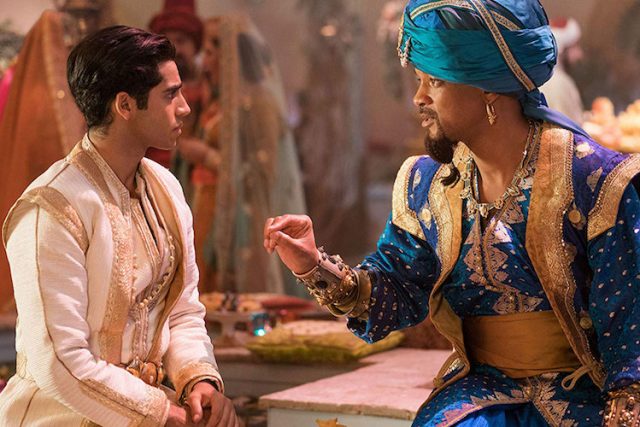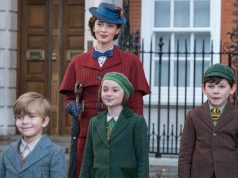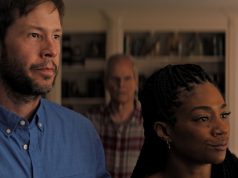
The new “Aladdin,” directed by English film lad Guy Ritchie (“Snatch”), is unnecessary even by the standards of unnecessary remakes. It has the exact same plot as the 1992 animated classic, slowed down so it takes a half hour longer. The songs are the same but lack motion because they’re arranged as moderate hip-hop-inspired tracks instead of quick-step Jazz Age numbers. It’s less of a comedy this time, with the previously funny characters of Abu the monkey and Iago the parrot (even Rajah the tiger had his moments) now played entirely straight. Will Smith, charismatic as he is, doesn’t have a fraction of Robin Williams’ manic energy as the Genie, and he’s missing the thing that complemented Williams’ performance and made it so iconic: colorful, fluid, zippy animation. Ritchie’s live action, even with heavy assistance from CGI, feels mundane in a way that hand-drawn cartoons rarely did.
Aladdin the street rat and Jasmine the princess are played by Mena Massoud and Naomi Scott, both possessed of strong singing voices and pleasing physical features. Their dynamic is the same, but Jasmine doesn’t just want the freedom to leave the palace now; she wants to be sultan after her father (Navid Negahban) retires or dies, and sings a new song (lyrics by “La La Land’s” Benj Pasek and Justin Paul, music by original composer Alan Menken) about how she will not be silenced. (The song is fine. I don’t remember any of the melody. I saw the movie two hours ago.) The villain, Jafar (Marwan Kenzari), his parrot devoid of levity, is purely an antagonist now, his motivations expanded to include a warmongering, Cheney-under-Bush attitude toward foreign policy. New characters, both likable but underused, are Jasmine’s handmaiden, Dalia (Nasim Pedrad), and a himbo suitor, Prince Anders (Billy Magnussen).
Some minor changes in the lyrics make sense. The reference in “Prince Ali” to “your Sunday salaam” has been revised to “Friday salaam,” since that’s the Muslim holy day. But the same song’s line “He’s got slaves, he’s got servants and flunkies” has been modified to “He’s got ten thousand servants and flunkies,” lest viewers think that someone as handsome as Prince Ali could possibly have had slaves, and the Genie’s line “Heard your princess was a sight lovely to see” is now “Heard your princess was hot — where is she?,” which is crass and doesn’t fit the meter (the latter bothers me more than the former).
Will Smith, who it turns out is not much of a singer, sings three songs, sometimes easing into it with a delivery that’s closer to rap. Two of those numbers, “Prince Ali” and “Friend Like Me,” are supposed to be showstoppers, but they don’t build to the kind of climax that brings the house down. Smith is too laidback and cool, as if not fully committed to the lunacy of what he’s supposed to be doing, and Ritchie is lost when it comes to staging musical numbers, perhaps so chastened by previous complaints of his choppy editing and frenetic action tendencies that he overcompensated and got too calm. Like that “Beauty and the Beast” thing a couple years ago, this improves on the original in no way whatsoever and is only palatable if you’ve never seen the other one. And if you haven’t seen the other one, well, do that. Why are we wasting our time here?
C (2 hrs., 7 min.; )





